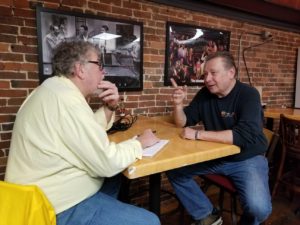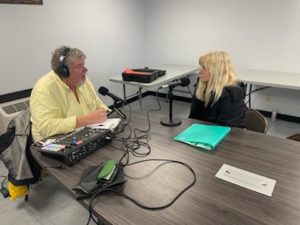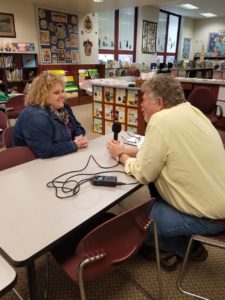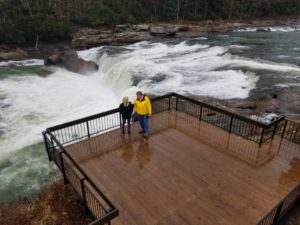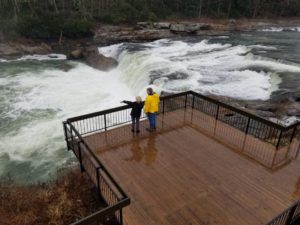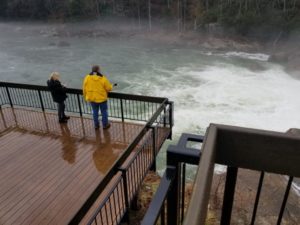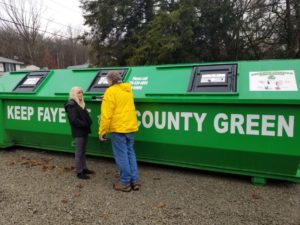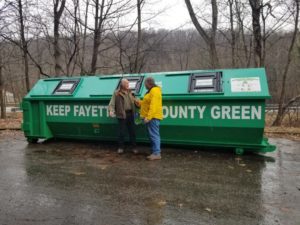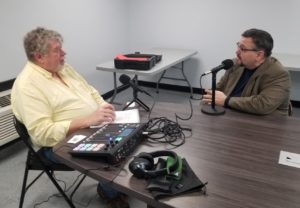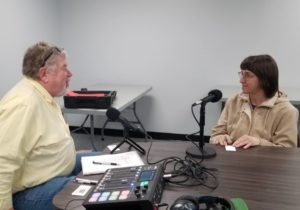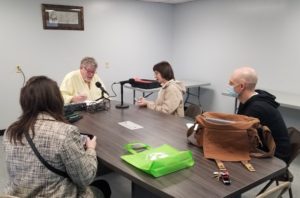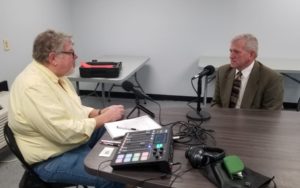Meet a county star who has created a recycling program in Fayette County, Pennsylvania that works!
Show Sponsors:
A Recycling Model for America in Fayette County, PA (S2E10) Transcription
Carol D’Auria: This is a good government show.
Shelia Shea: You need to make recycling convenient. Recycling is convenient. People will recycle. That’s what they tried to get through to you. So my vision when I came back was to have a drive thru facility where people could drive in, get their car unloaded and drive out, and we’d be able to take your hard to recycle items along with your regular recycling items.
Just think how much we’re saving the earth. That’s the plastic that didn’t end up in the ocean. That’s the hard to recycle items that’s not along the roads. You know, that’s keeping the country, our county clean. It’s keeping our county clean. And we’re saving our environment. And that’s the main thing. We’re reducing our carbon footprint.
David Martin: Less garbage, more recycling, less plastic in landfills and on the roads. This is a story about how one county wanted to make a big change and lessen their carbon footprint and the process they showed other governments how it could be done.
Carol D’Auria: Welcome to the Good Government Show. I’m Carol Deloria.
David Martin: And I’m Dave Martin.
Carol D’Auria: And this is the final episode of season two. It’s been a great season of stories and now we’ve wrap it up in Pennsylvania.
David Martin: But first, as this is our last show, the season, if you like what you heard this season on the good government show, please tell your friends to listen. Make sure to follow us and please like us on Facebook and follow us on Twitter. And please rate us where you are listening to us right now. Just take a moment.
Rate us. Good. Five star. Thank you. This will help us bring more stories of good government in action next season. Stories like this, one of a great recycling program. So, yes, on my way out to West Virginia, I stopped in the said County, Pennsylvania. And they are showing the state and really they’re showing the nation how to recycle and how it’s done.
Last year, they collected close to £1 million of recyclable items. That’s about 500 tons. And that’s paper. That’s plastic, that’s tires, that’s appliances. All of it saved in a landfill.
Carol D’Auria: That is absolutely helping the planet.
David Martin: It is. And along the way, they changed the way people recycle in their county and more importantly, the people of fair on board and recycling and the kids in schools are learning that this is what’s expected of them.
Carol D’Auria: So, in other words, tomorrow’s parents are learning this is just simply how it’s done.
David Martin: Right. And we’re going to need a teacher who does just that.
Carol D’Auria: Now, why is Fayette County doing such a great job, though?
David Martin: Sheila Shea.
Carol D’Auria: Oh.
David Martin: Right. She is the one with the vision. She had the determination and she was the voice who said, I can make this better.
Carol D’Auria: So she’s our good government hero.
David Martin: She is our good government hero. But first, we have to talk about how set came a model county for recycling in the state, if not the nation. So let me introduce you to Vince in this case. He’s a Fayette County commissioner and he’s a former county recycling coordinator. This is an issue he really cares about.
Vincent Vicites: A lot of people care about the environment, and there is a following for recycling in our county. It’s a tradition here in Fayette County. We were always a leader in recycling and we continue to be a leader in recycling.
Carol D’Auria: So the county has always been a leader in the recycling, huh?
David Martin: Yeah. So what happened was a goodwill national organization, they had a drop off center and they were handling the bulk of the county’s recycling. But they pulled out and Vince and the other commissioners saw an opportunity to create a really a stronger program. So they bought the center. They created a modern drop off center. And with the help of state funds, they really expanded the program, starting with new recycle bins.
Carol D’Auria: I love this. So the state and the county work together to make this happen, like the partnership.
David Martin: Right. But then I’m going to have Vince explain what really made the big change.
Vincent Vicites: We hired Sheila Shea and as our coordinator in 2016, and the program is continued to unfold and develop. And it’s garnering larger amounts of recycling. We’ve got the schools involved. They’re all recycling in Fayette County now. We got in businesses that had never recycled involved. We have businesses that maybe stopped recycling for a few years when the markets were bad.
They’re back in the game of recycling and participating. So and we’re promoting it countywide.
Carol D’Auria: Okay. So tell me about Sheila Shea.
David Martin: I’m going to tell you all about Sheila Shea after the break.
Carol D’Auria: Okay.
The Good Government Show welcomes a new sponsor for season two, and that’s NACO. And that’s the National Association of Counties. Carol, did you know that county government affects more people than any other form of government?
Carol D’Auria: Well, I do now. Funny you would think city or the federal government is bigger.
David Martin: Well, right, but. But it’s not. You’d think about this. Roads, highways, hospitals, schools, recycling, law enforcement, water, sewers: in most of the country, those services are maintained by the county. That’s county government.
Carol D’Auria: And we want to see good county government. And that’s where Naco comes in.
David Martin: Exactly. They’re a nationwide organization that represents all 3,069 counties across the U.S..
Carol D’Auria: Now, that’s a lot of support and more importantly, brain power.
David Martin: Exactly. And they have many organizations and committees and they do things like share best practices and they work together on national issues.
Carol D’Auria: And they are urban, suburban and rural counties that have different challenges. But they can still work together.
David Martin: Yes, they all work together. So NACO helps county government work better. And as we see in this and other episodes, when county government works well, that’s just good government.
Carol D’Auria: So thanks, NACO, for providing us with great stories and helping support good government.
David Martin: And thanks NACO for supporting the good government. And remember, citizens, don’t forget to vote.
So Sheila Shea. She is the one who really took this on as a mission and she kicked it into high gear as she told you at the top. She set out to make recycling easier and more convenient for everyone, and it’s worked. So I met with Sheila and I spent the day with her.
David Martin: We met first at the town’s recycling center in town.
Carol D’Auria: So what’s that like?
David Martin: Well, you have to check out the photos of Sheila. She’s in front of one of the large bins, and it’s clean. You drive in, you drop off the recycling center, and Sheila and her crew, they do the rest.
Carol D’Auria: So they take everything.
David Martin: They do computers, TVs, tires, furniture, appliances, paper and plastic. And chances are, if you pull your car in, Sheila Shea is going to be the one that improves the car. Yep, she is.
Carol D’Auria: I have a question. Yes. This is smell.
David Martin: No, it’s a very clean recycling. Oh, you walk in.
Carol D’Auria: Cause I see those things.
David Martin: No, there’s no reason to. There’s no reason to at the recycling center. Okay, walk in. It’s clean. They take really good care of the place from where you got this idea to where you are today. How do you feel about the progress you’ve made?
Shelia Shea: Shocked that it happened so quick. Amazed. Happy. I mean, I really got to see my vision come to life. It’s what I thought of when I started in 2017, and now it’s really coming to life, and I’m just excited that I can save the environment and to be able to do it for Fayette County, the county I live in.
Carol D’Auria: Good progress bins and a drop off center. And what are the collections like?
David Martin: Well, here are some stats. These are from 2021. And this is between the bins and the drop off center. So in said county, they collected, are you ready? 34 tons of scrap metal, 80 tons of mattresses and other furniture, 100 tons of electronics. That’s computers. That’s TVs, ovens, radios.
Carol D’Auria: Wow.
David Martin: 3800 tires. And that’s almost 24 tons.
Carol D’Auria: Those numbers are really impressive.
David Martin: It is CSA. It is a rural county and their population. It only makes them a medium sized county. But overall, they ranked fourth in recycling the state. So the two biggest cities, Philadelphia and Pittsburgh, they ranked just behind them. Hmm.
Carol D’Auria: So where I live on Long Island, my recycling gets picked up right at my house. But it’s different there, isn’t it?
David Martin: Yeah, it is. And there’s a mix fed. So they have drop off centers and they have 34 bins they placed around the county. And you’re going to hear about this as they travel around with Sheila. And if you check out our website, you’ll see the photos I took of the recycle bins. So there’s me and other people at the bins.
Carol D’Auria: You know, this is like you went on a recycling road trip.
David Martin: I did. So, you know, listen, Fayette County has some incredible sites. First, if you’re a history buff, as I am, it’s where George Washington had fought in the French and Indian Wars. This is where he built fort necessity. So it was it was like the frontier back then. It was the site of the Whiskey Rebellion. I’m sure you remember the Whiskey Rebellion in school.
No, no, no, no, no, really. They’ve a bunch of rural farmers in Pennsylvania decided they didn’t want to pay their whiskey tax. They got their muskets out, and for the first time, the president said, nope, nope, nope, you got to pay your tax. So he deployed troops and put down the Whiskey Rebellion right there and said, County, there’s natural caves.
There’s plenty of parks. There’s rivers, waterfalls and hiking trails. Folks come to this area. They do a lot of rafting. They do a lot of kayaking. A lot of hiking, mountain biking. Real popular destination.
Carol D’Auria: Is so rich in history. They really have an incentive between that and the tourism to keep it clean.
David Martin: Yeah, they really do. So let me introduce you to some of the folks who help the county recycle. They see the benefits of where they live and work. They’re going to explain all that to you. And we’re going to start we’re going to go back to school.
Christa Sabatula: My name is Chris Disabato, law and librarian at Manon School for the Uniontown Area School District. And we recycle at our school for K K to six for about ten, ten, 12 years. Now, recycling and whey we’re recycled school, we have containers in the classroom, containers in the hallway, and the students are recycling them from plastic to paper to cardboard, variety of things in school.
And the students are doing it. They have containers in the room, they put it in the room. The teacher says, Go dump it out. It goes in the hallways. And then we take it outside to a large recycling container that’s by the playground.
Carol D’Auria: Wow. Starting young.
David Martin: Exactly. The school has one of those large recycling bins, so all the kids at school recycle, and they see the program work. They actually can see it. And as Krista points out, there’s another benefit to starting the kids.
Christa Sabatula: YOUNG So it’s all there. You just have to teach. It’s not. It’s the kids you can teach is to get there. Adults and parents and who they live with to do it to at school. We can do it. But what happens when they go home? It’s the push to get the kids, to bring the parents, to bring the recycling up to the schools or the containers in the areas.
Carol D’Auria: That’s right. The kids teach the parents.
David Martin: Yup, the kids teach the parents. But mostly the kids get a really big kick out of seeing the recycling bins empty. And apparently it comes right after lunch. They’re all excited. It’s loud. It’s lots of noise that.
Carol D’Auria: They love is the distraction. I well.
David Martin: They might love the distraction, but, hey, either way, they really see what’s going on and they get into it. And there’s another element of this. The school is part of the national recycling program. So they recycle and they get points, which translates to money for the schools. So when the kids want new balls or a swing, they know how they have to pay for it.
They can earn it by recycling.
Carol D’Auria: And it’s such a great idea and it really makes it more meaningful. They can relate to it right?
David Martin: So now the kids know that when they toss the paper in the right, then that can mean a new kickball for their school. So continuing on my recycling tour of Fayette County, I went to a place called Liz’s Restaurant.
Carol D’Auria: So let me guess. You had a.
David Martin: Meal? Yeah, I did. You would have liked to resist in downtown Uniontown. Well, it’s got great pizza I had there. Italian wedding soup.
Carol D’Auria: That’s always a good one.
David Martin: Who doesn’t like good Italian wedding soup? Very nice. Their burgers, it’s kind of a neighborhood place and they’ve made recycling. It’s just part of their business. I talked with Jerome Vinick. He’s the owner’s dad, and twice a week he loads up his pickup truck and he recycles. And he’s been doing this for years, and he really appreciates what the county is doing.
Jerome Venick: I like it. It’s a step in the right direction. They’ve made it convenient because it’s convenient for me to go out to the recycling center because it’s not that far and I have a truck, but throughout the county they have their bins. So it’s not hard for anybody. There’s got to be a been relatively close no matter where you live in the county that you can recycle.
It’s just the right thing to do in my mind. I hate to see something go to a landfill if it can be reused and turn into a new product.
David Martin: So, Carol, are you ready to take a tour yourself? Because after the break, we’re going to Ohio Pyle, Ohio Pyle. We’re going to Ohio Pyle.
Carol D’Auria: I love the name.
David Martin: All right. You’ll have to wait more on that. But after the break.
Carol D’Auria: The Good Government Show is sponsored by Liquid.
David Martin: So here’s the thing about Liquid. They do their homework. So, Carol, I’m going to give you a fun fact. A recent study found that over 80% of retail shoppers conduct online research before making a purchase. Do you do that?
Carol D’Auria: Yeah, I like to know what I’m buying, but if you’re a business, it takes more time than researching for a new TV, say.
David Martin: Yeah. And for a business, you really have to do your research and you really have to evaluate who you’re working with and make sure the company are about to partner with is a good fit.
Carol D’Auria: And that makes sense. So you want to stand out to other companies that are checking out your company.
David Martin: And that’s where Liquid comes in. They can help your business create a digital presence with impact so you can be impressive to new businesses and, you know, keep your customers.
Carol D’Auria: And it’s not just about a website. See how much I learned about Liquid since the first season?
David Martin: Well, of course, well, Liquid our partners, we want to know everything about them. And what they can do is they can guide you to where to advertise and they can make sure your social media is relevant. And that it engages your customers and they make sure your digital story answers your potential customers’ questions before they even ask them.
Carol D’Auria: And that’s what Liquid is good at – creating a full marketing and online digital presence.
David Martin: Liquid’s been around for nearly two decades. They have lots of experience and a lot of research to back up their plans.
Carol D’Auria: And they have a team of designers, marketers, strategists and developers. They can help companies in many industries with award winning creative campaigns, content and websites.
David Martin: All good reasons to have Liquid plan your next digital marketing strategy. So check them out and talk to a Liquid professional. Visit them at www.liquidint.com.
Carol D’Auria: And you will love Liquid as much as we do.
David Martin: Because we love Liquid.
We want to welcome back as a sponsor to the Good Government Show, Kutztown University of Kutztown, Pennsylvania.
Carol D’Auria: And you want to talk about their rugby team?
David Martin: Well, they do have a good rugby team that just won a national tournament. And what I did was I called a friend, his daughter played at Kutztown, she played on the rugby team and asked him what did he like best about Kutztown?
Carol D’Auria: You mean besides the rugby team?
David Martin: Yeah, besides the team, obviously the team first. But he responded immediately and said something I didn’t know. His favorite thing is the chicken tower or it’s also called the Angry Chicken.
Carol D’Auria: What? I hesitate to ask. The Angry Chicken?
David Martin: Well, it’s such a landmark that it’s actually the school’s logo. It’s a clock tower. And apparently when you look from a special angle, the clock looks a little bit like a chicken with an open beak. So it’s the angry chicken.
Carol D’Auria: Okay, then. Well, let’s talk about the other stuff like that their degree program in music business is now nationally accredited. They offer undergraduate certificates in cybersecurity and technical writing.
David Martin: So is this what we do? Is this technical writing?
Carol D’Auria: Oh, no, no, no. Take his class and maybe get better at writing.
David Martin: Oh, come on. That’s not fair. You know what? You would benefit from the new graduate certificate program and be a school social worker. Maybe you’d be nicer.
Carol D’Auria: All right, well, the point is, Kutztown is a forward-looking university. They also offer Pell Promise scholarships. And for students to qualify, student tuitions and fees are all covered.
David Martin: And that’s just some of why we like Kutztown and are happy to be associated with this university. Oh, my friend thought it was really cool that sometimes the locals stay right here in a horse and buggy. So check out Kutztown University. That’s Kutztown University and cheer on the rugby team.
Carol D’Auria: Of course.
David Martin: Yes, please.
Carol D’Auria: Ohio Pyle. Let me say you did schools in downtown, so. Okay, tell me about Ohio Pyle.
David Martin: Okay, so Ohio. Pyle It’s the Ohio. Pyle Falls. It’s really the main attraction here, Sheila. And I’ve walked out on the observation platform at the Falls, and I can see why people come here. So listen.
Shelia Shea: We are standing on the balcony looking at the Ohio POW Falls, the waterfall.
David Martin: And is this what brings everybody that is here?
Shelia Shea: This is what brings everybody to this area. The rafting, the waterfall, the hiking, the bike trail. Yeah, that’s what brings everybody here.
David Martin: So how close are we to the closest recycling bin?
Shelia Shea: Less than a mile.
Carol D’Auria: You know, I can actually hear the falls over your conversation. I think you want to go?
David Martin: Yeah, you should check it out and by the way, there’s photos on our site. You can see me doing the interview right there on the platform.
Carol D’Auria: A sight to behold, I’m sure. Yes. So they really are getting the entire area to recycle and.
David Martin: Okay, so Ohio piles, not just falls. It’s my new favorite town. Let me tell you about Ohio Pile, the town population 37.
Carol D’Auria: 37, 37 people just on my one block.
David Martin: I think there’s like 14 houses there altogether. Wow. It’s a small town. It’s a big tourist destination. So there’s just, you know, a few people who live there. But then there’s, you know, you can rent bikes and kayaks, etc..
Carol D’Auria: Amazing.
David Martin: But yes, people come to Ohio pile and we stop by the did recycle bin that’s in the town of Ohio pile and we stop by mid-March really before the tourist season began.
Shelia Shea: During the winter months, there’s hardly there might be three or 400 people through the area in the summer months. There’s over a million people that comes to Ohio State Park, so we pick it up weekly. So for this being an off season, yeah, it’s good we’re getting a lot more residents to recycle and help us keep our county green.
Carol D’Auria: This really is a government project that is really seems to be embraced by everyone.
David Martin: It is not going to introduce you to Ben Moyer and he lives near the falls and he really wants to keep this area beautiful because for him, it’s personal. This is his home.
Carol D’Auria: And of course, he takes pride in his hometown.
David Martin: He really does. And he spreads the gospel of recycling and he lets his neighbors know how they can pitch in. So one day I met him just outside the falls. It was raining. So we had to set in an awning. It was a kayak rental shop, but we were just a few feet from the recycle bin that’s located inside the state park.
Ben Moyer: They came down here to fish one day and found this bin and I said, This is even better. So I just I just and it’s only five miles from where I live and I’m always down this way anyway. So I bring my recycling down here and put it in there.
David Martin: So check out the photo of Bob and I. We’re standing in front of one of the bins on my recycling tour, and he really appreciates this aggressive counting program.
Ben Moyer: We finally, after a long time, we have leadership in county government to match the significant natural resource base that we have here, and so that people can make a positive contribution to this by responsibly recycling their waste.
Carol D’Auria: So just how many bins are there?
David Martin: Well, there are 34 bins. They’re located throughout Fayette County. And here’s a here’s a little fun fact. More than £1,000,000 is over 500 tons. So, Carol, think about that. Now, don’t hold me to my math here.
Carol D’Auria: I would never do that.
David Martin: But when you add that up, it’s about 1000 garbage trucks.
Carol D’Auria: That’s a lot, right?
David Martin: 1000 garbage trucks full of recycled material. All of it staying out of a landfill.
Carol D’Auria: You know, when it comes to recycling strength, clearly they are punching above their weight.
David Martin: Say it is punching above its weight and it’s created a model for the entire state. So Pat’s, to find out, is the area state senator and he’s quick to offer up say its program as an example to others.
Pat Stefano: I tell you the best part about this program and recycling in general, it’s how much you can pull out of your landfill and then reuse, recycle, reuse. You hear that term a lot. That’s what’s most important in their county has been one of the premier counties leading that charge in getting waste out of the landfill. And then I encourage all municipalities to be involved, to work with Fayette County here locally and then in other counties across the state, to reach out to Fayette County to see how they’re doing their program, if they can install and and do a similar program themselves.
David Martin: So while I was at the recycling center, I met with Sharon Spivack. She’s the program manager for Waste Management for the Pennsylvania Department of Environmental Protection. Her office helps with state funds for the project. What is it about this program that impresses.
Sharon Svitek: You, the fact that they’re all cooperating together, like the county, working with all the local municipalities, working with the school districts?
David Martin: That impresses me is that unusual? Is that hard?
Sharon Svitek: Well, that’s that’s difficult to get elected officials all working together on the same page. And I think that that’s that shows that everyone wants this recycling program. And for the county to work.
Carol D’Auria: It sounds like it’s working.
David Martin: It is. And it really shows how when politicians make the right plans and hire the right people. Sheila Shea. Sheila Shea. Sheila Shea. They can make government work for the people they serve. And I want to go back to Vince. He’s the former recycling manager turned county commissioner. I asked him what he tells other people about this program.
Vincent Vicites: I tell them we’ve really progressed. You talk about an example of good government in Fayette County. Look at our recycling program. And, you know, that’s it’s working. It’s it’s noted as one of the best in the state it has been for 30 years. And we’re you know, we’ve reconfigured it since 2015. And it’s it’s back up there again is one of the best.
David Martin: And they have plans to expand. They’re working with other area businesses and they’re going to expand the program. And the future may hold ways to convert recycling into energy. All of that is being examined. Scott Durham, this is another county commissioner. He says for him, tires tossed on the side of the road. It’s just the biggest recycling challenge.
Scott Dunn: Littering of tires has been a problem here. So, you know, not only do we develop business based on recycling, we actually beautify our county. And I you know, I’m maybe biased, but I think we are the most beautiful county in the state of Pennsylvania.
Carol D’Auria: So I’m just so amazed that you think a rural county like this wouldn’t be so progressive. But they really are. So who are you going to give the last word on Fayette County recycling?
David Martin: Well, we only one person. We have to go back to our hero, Sheila Shea.
Carol D’Auria: She needs a medal.
David Martin: She does.
Shelia Shea: I just it it was the job I always give 110% and whatever I’m doing. And it it was a good thing for the county. It’s a good thing for the environment. I’m making a difference. And I just I get that kind of passion when, you know, I’m just excited to do it. It’s it’s just my job.
Carol D’Auria: Well, that’s what I’m talking about. This is great. Sheila is not an elected official. She’s not running for any office. She isn’t in it for the power or the prestige. She is simply doing her job.
David Martin: Doing her job?
Carol D’Auria: Yeah, I love it.
David Martin: She’s doing the job the county hired her to do. Right. And she cares.
Carol D’Auria: She does. And one of the many government workers, you know, who people really never see there behind the scenes, they just get up, they go to work. They’re truly dedicated to serving the people.
David Martin: Sheila Shea truly is good government at its finest.
Carol D’Auria: And that’s what our show is about. Good government. What a great way to wrap up the season.
David Martin: It is a government worker, not in the always glamorous pursuit of collecting trash, but she’s cleaning up her county.
Carol D’Auria: You know, it’s been quite a season on the good government show. So here’s a question for you. Yes. What was your favorite story?
David Martin: Well, my week in West Virginia really was pretty incredible. I got to go to coal country and see how they’re transforming coal country with two completely different approaches. One, teachers are leading the way to revitalize McDowell County. And in Boone County, they put a lavender farm where a coal mine used to be. And they’re hiring former coal workers to work in the farms.
So two really incredible stories, two really incredible government projects.
Carol D’Auria: And on top of that, I got lavender cream and I love it.
David Martin: Do you love your lavender? Have you been using it? Yes. Do you need more?
Carol D’Auria: No, I don’t need more. I use it judiciously.
David Martin: All right. Well, you could always get more. How about. How about some spray mist or some some lavender CBD?
Carol D’Auria: Green mist? After my son has been sitting in the car. There you.
David Martin: Go. Appalachian Botanical Account. Check them out. Yes. So what about you, Cara? What were your favorite stories this year?
Carol D’Auria: Well, I have to say, I really loved the foster parents story. I love those young women trying to make their life for survivors. Oh, I love those kind of survivors. And but the county really helped them out. Sure. And really gave them a helping hand.
David Martin: And it’s a pilot project. So with any luck at all, other counties will pick up on this. It’ll get expanded and we’ll see more of these.
Carol D’Auria: Absolutely.
David Martin: We have to stay on top of that one.
Carol D’Auria: Yes, we.
David Martin: To stay on top of all these stories, because I’m going back to West Virginia because remember the barbecue festival?
Carol D’Auria: Oh, that’s right. It’s not about.
David Martin: That. The coal country barbecue. First thing.
Carol D’Auria: I get in on that one, you know, you have all the fun.
David Martin: If you think it should go. All right. Well, you know, we got a trip to West Virginia planned, so. Yeah, a lot of great stories this year. Hey, we have more. You’re going to have to wait for season three. We have more. I’m going to preview this.
Carol D’Auria: Okay.
David Martin: I’m going back to West Virginia.
Carol D’Auria: You’re going back to West Virginia.
David Martin: I got a little story West Virginia I have.
Carol D’Auria: In your pocket that you’re not telling.
David Martin: Me about. I got a story on West Virginia where.
Carol D’Auria: It better not be a barbecue thing.
David Martin: I well.
Carol D’Auria: Because I’m coming.
David Martin: Depends on how timing is. Everything. We’ll see. We’ll see. But I know I am going back to West Virginia. There’s a really inspiring story there about a new national park that just really.
Carol D’Auria: Yeah, so we’ll have to wait for next season.
David Martin: They’ve changed that. Yeah, we’ve got a lot of stuff we’re working on. So we have I have files and files of stories to look for. So yes, but I’m going back to West Virginia. So all that’s coming up in season three. Well, so listen.
Carol D’Auria: I was going to say thank you to everybody who’s been listening.
David Martin: I was going to say thanks, everybody, for listening. Hey, we hope you enjoyed season season two. Here we have ten great stories this year. We have five stories of good government show extras. So please check it out. Check it out. Where you listen to your podcasts, please tell your friends, check out our website. You can see and meet some of the people that we talk about.
David Martin: And we’ll be back for season three.
Carol D’Auria: And I’m Carol Diorio. We want to see you back.
David Martin: And I’m Dave Martin. This is the good government show. Thanks for listening.
Thanks for listening. If you like our show, please tell your friends to listen, too. Follow us and like us on Facebook or follow us on Twitter and be part of the conversation. And please give us a five star rating right here when you’re listening to this podcast. Your support helps us continue to tell stories of good government in action.
For extras on all of our shows, visit our website, goodgovernmentshow.com.
The Good Government Show is produced by Valley Park Productions. Jim Ludlow, David Martin and David Snyder are the executive producers. Jason Stershic is our producer and editor. Some transcriptions were done by Kofi Ajeasi Ampah. Our hosts are me, David Martin and Carol D’Auria. Join us again for the Good Government Show, wherever you listen to podcasts



